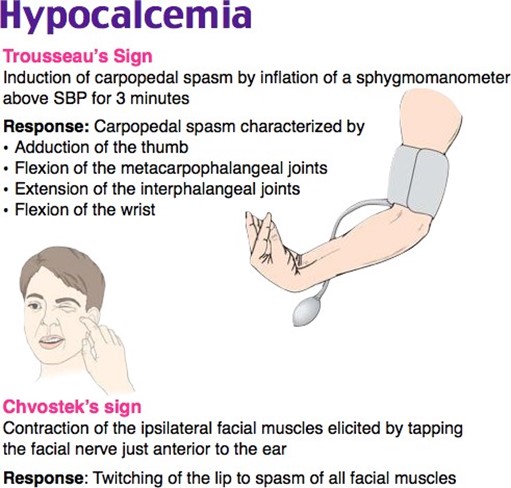The nurse is caring for a patient diagnosed with hypocalcemia. What additional assessments should the nurse include when caring for this patient?
Drug toxicity.
Other electrolyte disturbances.
Hypertension.
Visual disturbances.
The Correct Answer is B
Other electrolyte disturbances.
Choice A rationale:
Drug toxicity is not directly related to hypocalcemia. The main concern in hypocalcemia is the calcium imbalance itself, not drug toxicity.
Choice B rationale:
Other electrolyte disturbances should be assessed because imbalances in other electrolytes, such as potassium and magnesium, are often associated with hypocalcemia. Electrolyte imbalances can interact and exacerbate each other, potentially leading to more severe complications.
Choice C rationale:
Hypertension is not a typical assessment finding in hypocalcemia. Hypertension is not directly related to calcium levels but may have other underlying causes.
Choice D rationale:
Visual disturbances are not commonly associated with hypocalcemia. Hypocalcemia is more likely to present with neuromuscular and cardiovascular symptoms, rather than visual disturbances.
Nursing Test Bank
Naxlex Comprehensive Predictor Exams
Related Questions
Correct Answer is ["A","B","C"]
Explanation
Choice A rationale:

The nurse considered contraction of facial muscles as a finding of hypocalcemia because it is associated with Chvostek's sign, which indicates neuromuscular irritability due to low calcium levels.
Choice B rationale:
Complaints of fingers tingling are indicative of hypocalcemia since tingling sensations (paresthesias) in the extremities can result from decreased calcium levels affecting nerve function.
Choice C rationale:
Carpal spasm with blood pressure measurement is known as Trousseau's sign and is associated with hypocalcemia. When the blood pressure cuff is inflated above systolic pressure, it can cause tetany in the hand if the calcium levels are low.
Choice D rationale:
Asking when foot numbness would go away does not directly relate to hypocalcemia or its symptoms. It is not a finding used to come to the conclusion of hypocalcemia in this scenario.
Choice E rationale:
The heart rate being 88 and regular does not directly indicate hypocalcemia. While hypocalcemia can lead to cardiac arrhythmias, a heart rate of 88 and regular is within the normal range and not a specific finding for hypocalcemia.
Correct Answer is ["A","C","D"]
Explanation
The correct answer is choice A, C, and D.
Choice A rationale:
Lethargy is a common symptom of metabolic alkalosis due to the body’s attempt to compensate for the altered pH balance, leading to decreased energy levels and fatigue.
Choice B rationale:
Kussmaul’s respirations are typically associated with metabolic acidosis, not alkalosis. These deep, labored breaths are the body’s way of trying to expel excess carbon dioxide to correct acidosis.
Choice C rationale:
Circumoral paresthesia, or tingling around the mouth, is a symptom of metabolic alkalosis. This occurs due to changes in calcium ion concentration affecting nerve function.
Choice D rationale:
Bicarbonate excess is a direct cause of metabolic alkalosis. Elevated bicarbonate levels in the blood lead to an increased pH, resulting in alkalosis.
Choice E rationale:
Flushing is not a typical symptom of metabolic alkalosis. It is more commonly associated with conditions that cause vasodilation or increased blood flow to the skin.
Whether you are a student looking to ace your exams or a practicing nurse seeking to enhance your expertise , our nursing education contents will empower you with the confidence and competence to make a difference in the lives of patients and become a respected leader in the healthcare field.
Visit Naxlex, invest in your future and unlock endless possibilities with our unparalleled nursing education contents today
Report Wrong Answer on the Current Question
Do you disagree with the answer? If yes, what is your expected answer? Explain.
Kindly be descriptive with the issue you are facing.
